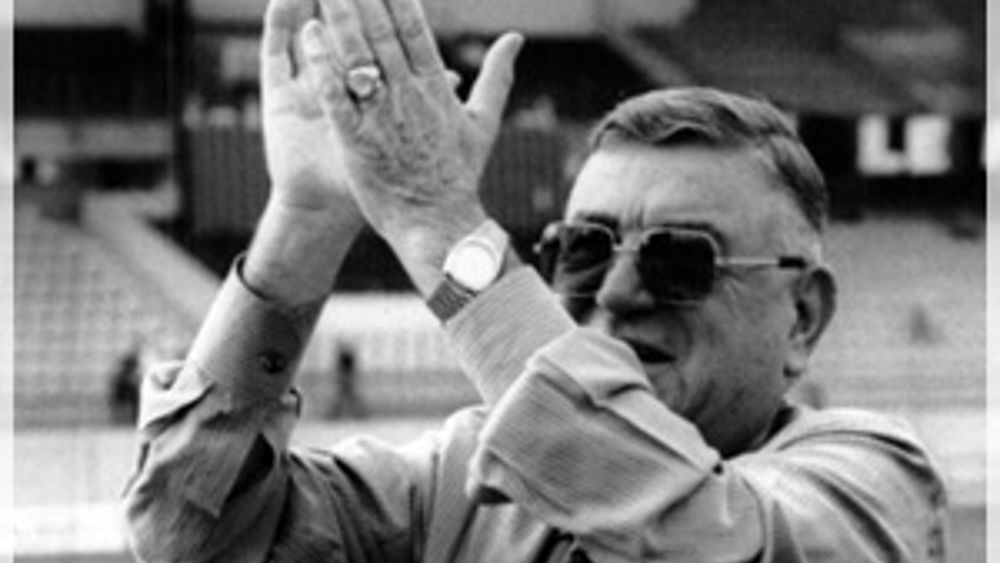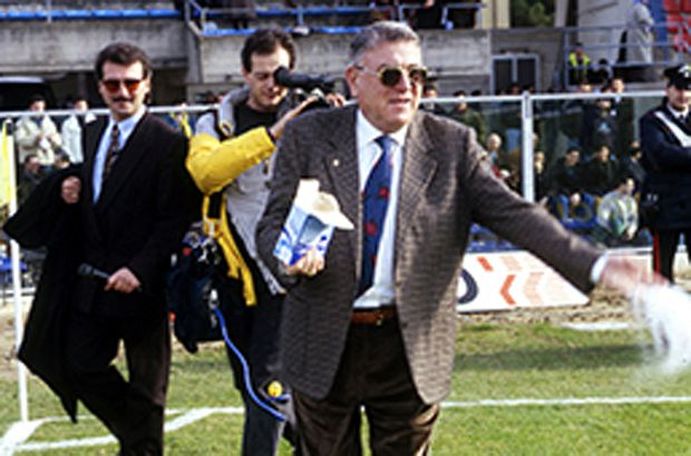Born in Trieste in 1922, Romeo Anconetani was the hugely popular, charismatic and superstitious president of Pisa throughout the 1980s and early 1990s.
Conscripted into the infantry in Sicily during the Second World War, it was the post-war period that saw Anconetani take his first steps into the world of calcio, holding the post of club secretary at various Tuscan clubs in the 1950s, including Empoli and Prato. At Empoli, Anconetani introduced the concept of advanced ticket sales for supporters for the first time in Italy. Likewise at Prato, Anconetani was among the first to organise football specials—trains chartered specifically to transport supporters to away games.
Despite these notable achievements, Anconetani is best remembered for his spell as president of Pisa following his acquisition of the club in 1978, which lasted until the club was declared bankrupt in 1994.
The arrival of Anconetani at Pisa heralded the arrival of the most successful period in the club’s history. Nicknamed ‘Il Presidentissimo’ by supporters and media alike, he led Pisa to promotion from Serie C in his first year at the helm. This was followed by promotion to Serie A in 1982.
The Tuscans’ only previous season in Italy’s top flight had ended in relegation in 1969. However, this fate was avoided comfortably with Pisa finishing the 1982-83 season in 11th place in Serie A. But Pisa did succumb to relegation the following year, despite being roared on by 15,000 travelling fans in the San Siro for the penultimate game of the season.
The club would eventually spend the 1980s and ‘90s fluctuating between Serie A and B, with Anconetani garnering a reputation as a mangia-allentori, or manager-eater, having got through 22 head coaches in his 16-year reign. Likewise, Anconetani oversaw success in Europe as well as in the league, with Pisa winning the now defunct Mitropa Cup on two occasions in 1986 and 1988. Additionally, they were only denied a place in the final of the 1987 Coppa Italia due to defeat against a Diego Maradona-inspired Napoli in the semi-final.
Unparalleled success on the pitch is all well and good. However, the reasons why Romeo Anconetani remains so revered in Pisa stretch beyond silverware and top-flight football. Marco Malvadi recounts in his 2015 book, Scacco alla Torre, a wonderful tale that perhaps encapsulates why the legend of Anconetani endures to this day.
Malvadi recalls the transfer deadline day of summer 1990. With the window about to slam shut, Pisa still had plenty of business to do. A fax arrived from Argentina with a list of available players. The information available on the players was scant, limited to a profile picture, positon, height and weight. There was precious little to determine their talent, but Anconetani was undeterred. Studying the fax before uttering decidedly, “quetto qui e quetto qua,” or “this one and that one,” Anconetani was particularly taken with one picture in particular, stating “I like him, he has a determined face.”
With that, Diego Simeone became arguably one of the greatest signings in Pisan history, joining the Tuscan outfit alongside compatriot Jose Antonio Chamot. Other notable signings during this period included Dunga, Wim Kieft, Klaus Berggreen and Paul Elliott, who remains to this day the only man to have ever cleared the stadium perimeter with a clearance.
While there may have been an element of good fortune with these signings, Anconetani was not one for leaving anything to chance when it came to pre-match rituals. A deeply superstitious man, he had a penchant for throwing salt onto the pitch at the Arena Garibaldi, convinced that this would bring good luck. This ‘salting’ took place before every home game. However, the more important the game, the more salt Anconetani sprinkled on the pitch. The ritual took on a whole new dimension ahead of one crunch match against Cesena in December 1990, where it was reported that Anconetani sprinkled 26 kilogrammes of salt onto the pitch ahead of the game. An inspired Pisa went on to beat Marcello Lippi’s Cesena 3-2, although this did not prevent both teams from being relegated to Serie B at the end of the season.
Unfortunately this superstition did not always bring about the desired result on the pitch. A case in point being the visit of Arrigo Sacchi’s Milan side in the 1988-89 season. On the eve of the game, Anconetani ordered his players to pay a visit to the hotel that the likes of Ruud Gullit and Marco van Basten were occupying in order to ‘salt’ the corridors and rooms. By all accounts, the Milan side found the hotel corridors unpassable and resembling a quagmire. This didn’t stop van Basten bagging a brace in a 2-0 victory the following day.<
Anconetani on one of his famous ‘saltings’.
Recently, there has been a heart-warming recurrence of Anconetani’s ritual. Ahead of last May’s play off semi-final against Pordenone, unseasonably bad weather hit Pisa. The thick layer of hailstone which coated the Arena on the eve of the game was heralded by supporters as their Romeo, who had passed away at the age of 77 in 1999, looking down on his beloved Pisa and continuing his tradition of salting the pitch ahead of a vital game. The 3-0 victory that followed, alongside the subsequent promotion to Serie B following victory over Foggia in the final, saw many a glass raised to Anconetani during the celebrations throughout the city.
Anconetani’s time in Pisa was not without controversy. During the 1991-92 season, with the Arena undergoing renovations, Pisa were forced to host a Coppa Italia game at the stadium of near neighbours and bitter rivals Livorno. This sparked an idea, with Anconetani sharing his vision of a combined team playing in a new state of the art 40,000 seater stadium in San Piero a Grado (a town in the province of Pisa but close to the city of Livorno). This new team would be called Pisorno. The subsequent protests and near-riot quickly resulted in the idea of Pisorno being shelved.
Anconetani remained president of Pisa for two more years before the eventual failure of the society and subsequent bankruptcy of the club in the summer of 1994. He kept a low profile following his departure from Pisa, though he did act as a consultant to Silvio Berlusconi at Milan up until his death in 1999. Yet, despite the bankruptcy and the Pisorno fiasco, Anconetani remains a heroic figure in Pisa, and the Arena Garibaldi was renamed in 2001 to Arena Garibaldi Romeo Anconetani.
The high regard in which Anconetani is still held in Pisa was perhaps best evidenced during the recent takeover battle that rumbled on in the boardroom for the final six months of 2016. The respected journalist, Ivan Zazzaroni, took up the cause by frequently highlighting the struggle Pisa supporters faced in their pursuit of a change of ownership. There was some scepticism amongst supporters as to whether or not Zazzaroni’s interest in the cause was genuine. However, once the takeover had been completed and the dust had settled, Zazzaroni’s contribution was reappraised.
An apology was offered to Zazzaroni for questioning his motives, along with an explanation that only people who would have been trusted enough to avoid such questions would be Gennaro Gattuso and, of course, Romeo Anconetani.
Words by Allan Gaskin: @allan_gaskin
Allan is based in Manchester but with ties to Tuscany. He has a passion for Italian football at all levels, with Pisa being his team of choice.


